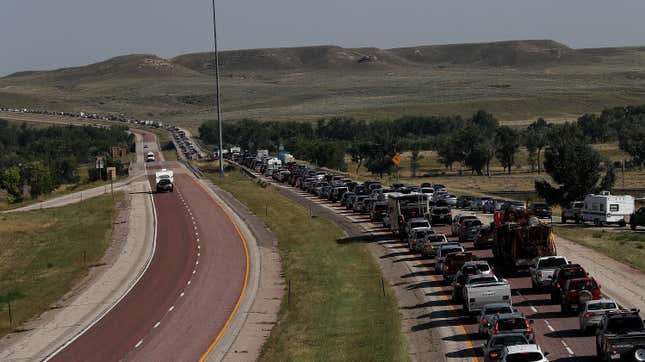
The upcoming solar eclipse on April 8 is expected to attract millions of people yearning for a glimpse of the rare astronomical phenomenon. However, eclipse-goers will have to migrate to a 115-mile-wide path of totality that sweeps from Texas to Maine. Cities along the path, such as Indianapolis, are bracing for congestion while smaller communities are set to be completely overwhelmed by travelers. Numerous agencies are looking back to 2017’s solar eclipse to prepare their plans.
Indiana isn’t playing any games when it comes to April’s eclipse, especially with the state’s capital and largest city impacted by the event. According to WRTV, the Indiana Department of Transportation is limiting any construction in the area along the path of totality. The Indiana State Police have blocked out the date as a day off and will have every trooper working. An ISP Sargent told the TV station:
“I think there’s an element of selfishness. People think, ‘I’m going to leave when I want to leave at the point where I want to get there,’ and then they’re going to find themselves in that traffic. They’re going to be running late, which may lead to aggressive driving, which could lead to a crash. You could see the chain of events based on selfishness that could lead to issues for other people.”
“Think of it like a football game. You’re not leaving in the fourth quarter, you’re staying until the game is done, and making sure you stay a little in the parking lot.”
Parts of Texas are expecting to see their populations temporarily multiply. KUT reports that relied-upon estimates have Kerrville, a town of 25,000 about 100 miles west of Austin, seeing 488,000 visitors. The Texas Department of Transportation is planning to have tow trucks on standby to deal with any incidents. There are also concerns that drivers could spark fires by pulling over their hot vehicles onto dry grass. Neighboring Oklahoma is setting up a portable camera network to monitor traffic congestion.
The fears may sound overblown, but it isn’t without precedent. According to Transportation Research News, it’s estimated that five million people traveled to the 2017 eclipse’s path of totality. Nearly every eclipse-goer ultimately got there by car, either by driving directly or taking a flight to a nearby airport and driving the rest of the way. If you’re heading to next month’s eclipse, bring supplies expecting to spend hours in traffic and please don’t pull over on a highway to look up.
Ryan Erik King writes for Jalopnik, which like the Root, is owned by G/O Media.

